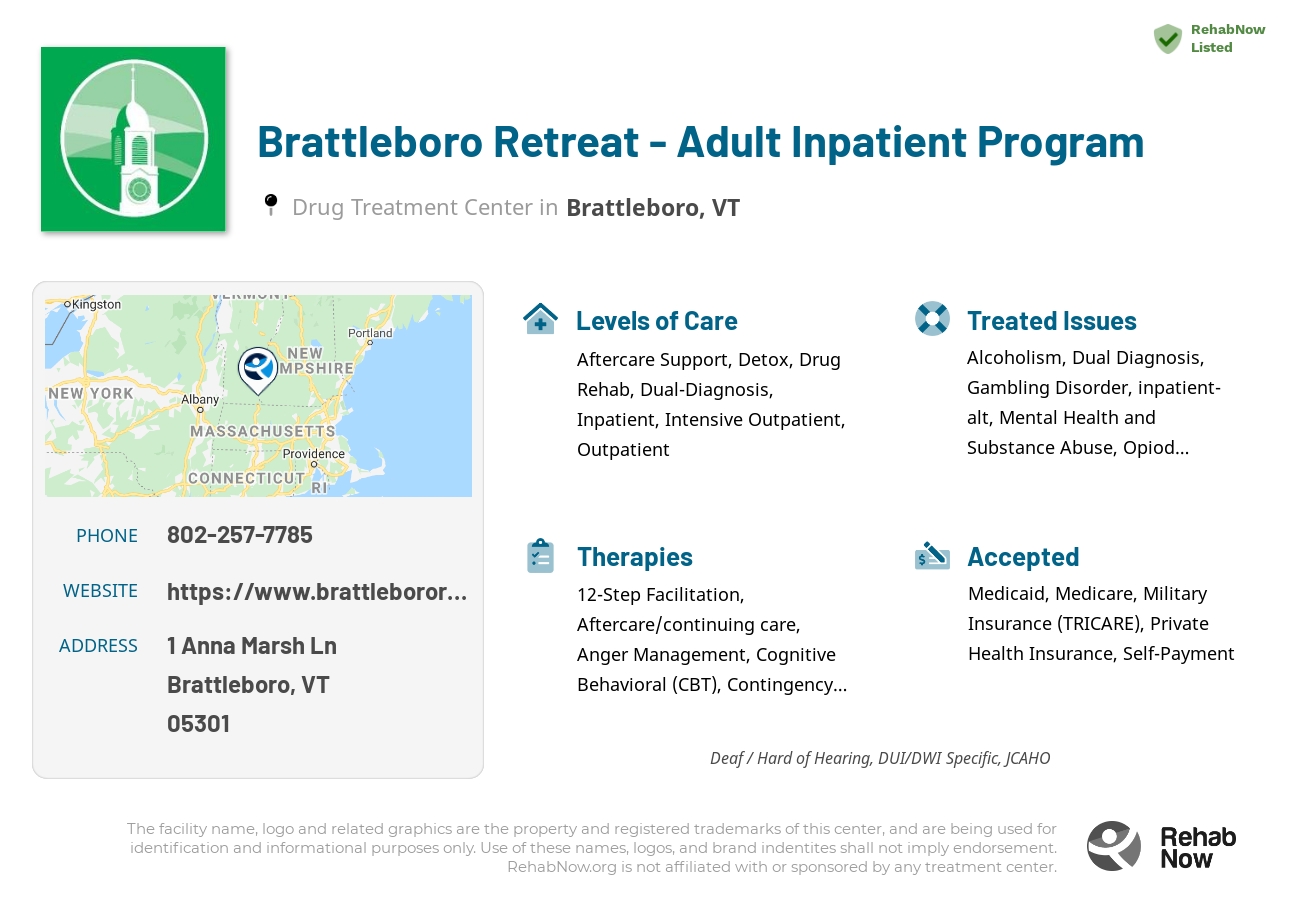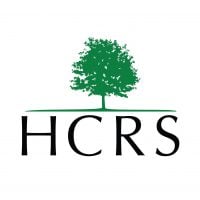Brattleboro Retreat - Adult Inpatient Program
Drug Rehab Center in Brattleboro, Vermont
Brattleboro Retreat is an accredited mental health and addiction treatment center offering a wide range of treatment programs and therapies for substance abuse, behavioral health concerns, and other mental health issues.
About This Vermont Facility
The Brattleboro Retreat is a mental health and addiction treatment center based in Brattleboro, Vermont. Founded in 1834, the Retreat is one of the oldest mental health facilities in the United States. As a comprehensive healthcare center for adults, the Retreat offers an inpatient treatment program for substance abuse and behavioral health concerns, including alcohol and opioid addiction, dual diagnosis, and other mental health issues.
The Retreat provides a continuum of care, including aftercare support, detox and drug rehab, dual-diagnosis, inpatient, intensive outpatient, and outpatient services. Treatment methods and therapies are wide-ranging and include 12-Step facilitation, anger management, cognitive behavioral therapy, contingency management, couples therapy, dialectical behavioral therapy, family therapy, group therapy, health education, substance use counseling, trauma therapy, and more. The Retreat is accredited by the Joint Commission on Accreditation of Healthcare Organizations (JCAHO) and accepts private health insurance, as well as offering affiliated services with the Brattleboro Retreat.
Genders
Ages
Modality
Additional
Accreditations

JCAHO
Conditions and Issues Treated
Substance abuse typically leads to addiction, which requires specialized treatment programs at Brattleboro Retreat - Adult Inpatient Program to address. Many people benefit from inpatient drug rehabilitation, which includes inpatient acute care and residential rehabilitation. Other levels of care include intensive outpatient therapy, individual counseling, and support groups. Family therapy is also an essential part of treatment for substance abuse.
A combination of treatments is often needed to treat drug abuse issues effectively. In the case of drug abuse, there is no easy answer or one-size-fits-all cure.
Opioid addiction treatment helps people addicted to opioids in Vermont curb their drug use. The selection of a treatment setting depends on the severity of the addiction. Mild cases are usually treated in outpatient facilities; severe cases need hospitalization or treatment in a residential facility. Doctors use medicines along with counseling and behavioral therapies to treat the addiction. The treatment includes medication, counseling and therapy. It can also include group counseling, individual counseling and family counseling.
People with dual diagnosis have coexisting addiction and a mental disorder. 9.2 million US adults had a co-occurring disorder in 2018, so not just limited to Vermont residents. Best treatment combines medication, psychotherapy (talk therapy), support group, and inpatient rehabilitation. Sometimes, complementary therapies – yoga, massage, and acupuncture – may also be used.
Levels of Care Offered at Brattleboro Retreat - Adult Inpatient Program
This center offers a variety of custom treatment tailored to individual recovery. Currently available are Aftercare Support, Detox, Drug Rehab, Dual-Diagnosis, Inpatient, Intensive Outpatient, Outpatient, with additional therapies available as listed below.
Detox is the stage of recovery where the drugs or alcohol are entirely removed from your body. There are two different ways to detox, with medications and without. For many drugs and alcohol, the acute phase of detox can be completed in a number of days.
Inpatient rehab means living at the Brattleboro, VT facility while all aspects of an addiction or co-occurring disorder get addressed. This helps limit the distractions and increase the focus on recovery. Typical inpatient rehab stays are approximately one month long.
Brattleboro Retreat - Adult Inpatient Program offers an Intensive Outpatient Program is for those who need intensive care but prefer to spend the majority of their time in the comfort of their own home. The rehabilitation services differ in length and intensity. They are customized to meet the needs of the patient.
Outpatient treatment plans cover diagnosis, detoxification, management, and counseling. They are a popular option for those who have graduated from inpatient facilities. Services in Vermont include medication-assisted treatment (MAT) and individual and group therapy.
After treatment, addiction treatment can be frightening for newly sober people. Aftercare support provided by Brattleboro Retreat - Adult Inpatient Program is designed to give resources and help on a continued basis. It can involve finding housing in and around Vermont, setting up 12-step meeting groups, continued medical monitoring, and counseling.
Therapies & Programs
Couples therapy aims to rebuild the trust between the partners. Partner’s involvement in the process will result in greater chances of treatment success. Couples therapy addresses financial issues, loss of trust, lack of intimacy, and physical abuse.
Family therapy is a set of therapeutic approaches that assumes that the entire family is a system. It utilizes the strengths and resources of the family to help the patient refrain from resorting to substance abuse. The impact of substance abuse is not just on the patient but on the entire family. Family therapy ensures that the patient gets adequate support from the family members after the treatment making the recovery process sustainable
- Family therapy guides all the members of the family to help the patient.
- It helps to repair relationships and improve communication between family members.
- It helps to keep the patient engaged and motivated throughout the treatment.
Group therapy is an important tool in recovery. Finding a peer group in Brattleboro, VT and others who relate to your situation is a fundamental tool for recovery at Brattleboro Retreat - Adult Inpatient Program. Addiction tends to lead to isolation and feelings of uniqueness. The accountability and friendship that is found in group therapy can be more effective than any single other treatment approach. This is generally introduced early in recovery and is recommended as a lifetime treatment habit.
Trauma therapy is a way of addressing trauma while in a safe situation in order to heal. This may involve Brattleboro Retreat - Adult Inpatient Program managing individual or group counseling or both. Other forms of therapy have been proven to assist in healing past traumas.
A type of cognitive-behavioral therapy is Dialectical Behavioral Therapy. It is intended for those who are vulnerable to self-harm and suicidal thoughts. Brattleboro Retreat - Adult Inpatient Program aims to help patients understand the connection between their feelings, emotions, and behaviors and provide them with the tools to make a difference in Brattleboro, VT. For those whose addictions and habits originate from severe mental health problems, it is beneficial.
Negative feelings are common in substance abuse disorders. If not recognized, they can cause co-occurring disorders. CBT involves strategies that help to change the thinking and behavioral pattern. It can be administered as a monotherapy as well as a part of combination therapy.
The first three steps depend on the patient, so they are more specific and situational. The succeeding four steps center on practical issues brought on by substance abuse. Steps 8 and 9 deal with the social and emotional repercussions of addiction, encouraging patients to make amends to people they have wronged. These are followed by two steps revolving around the further exploration and reinforcement of Steps 1 to 9.
The last step requires an individual to extend a helping hand to people who are still in the early stages of their recovery.
Payment Options Accepted
For specific insurance or payment methods please contact us.
Is your insurance accepted?
Ask an expert, call (888) 674-0062
Brattleboro Retreat Associated Centers
Discover treatment facilities under the same provider.
- Brattleboro Retreat - Adolescent Inpatient Services in Brattleboro, VT
- Brattleboro Retreat - Birches PHP/IOP Program in Brattleboro, VT
- Brattleboro Retreat - Uniformed Services Program in Brattleboro, VT
Learn More About Brattleboro Retreat Centers
Additional Details
Specifics, location, and helpful extra information.
Brattleboro, Vermont 05301 Phone Number(802) 257-7785 Meta DetailsUpdated November 25, 2023
Staff Verified
What else do people call Brattleboro Retreat – Adult Inpatient Program?
People have occasionally also searched for “Brattleboro Retreat in Vermont”
Patient Reviews
There are no reviews yet. Be the first one to write one.
Brattleboro, Vermont Addiction Information
Vermont has the highest rate of illicit drug abuse in the nation. A third of all Vermonters who are addicted to drugs admit to first having abused prescription drugs. The largest drug threat in Vermont is opioids. Fentanyl, dubbed the most dangerous drug in America, is responsible for more than half of all opioid-related deaths in Vermont. A third of all residents aged 12 and older who are addicted to drugs admit to first having abused prescription drugs. In many overdose cases, cocaine is also a contributing factor.
Brattleboro, VT has one of the highest rates of drug addiction in the country. The most commonly abused drugs include opioids, marijuana, and cocaine. In 2015, there were 9 heroin-related deaths in the area. Inpatient and outpatient programs are both available, and offer a range of services. Do some research on different facilities in your area to find a facility that has a good reputation.
Treatment in Nearby Cities
- Saint Albans Bay, VT (138.0 mi.)
- Bennington, VT (32.2 mi.)
- Rochester, VT (71.3 mi.)
- Morrisville, VT (117.8 mi.)
- Castleton, VT (60.6 mi.)
Centers near Brattleboro Retreat - Adult Inpatient Program
The facility name, logo and brand are the property and registered trademarks of Brattleboro Retreat - Adult Inpatient Program, and are being used for identification and informational purposes only. Use of these names, logos and brands shall not imply endorsement. RehabNow.org is not affiliated with or sponsored by Brattleboro Retreat - Adult Inpatient Program.











